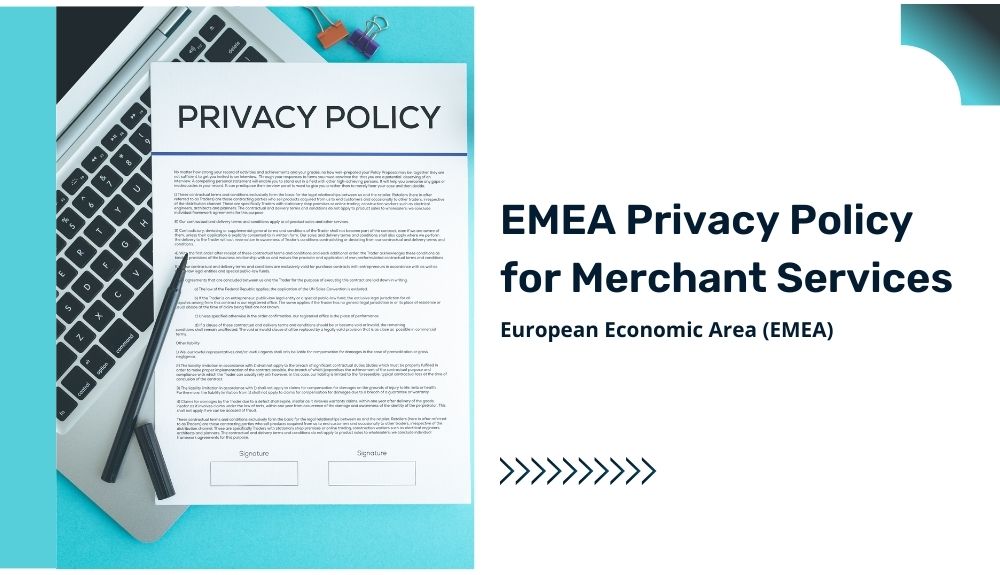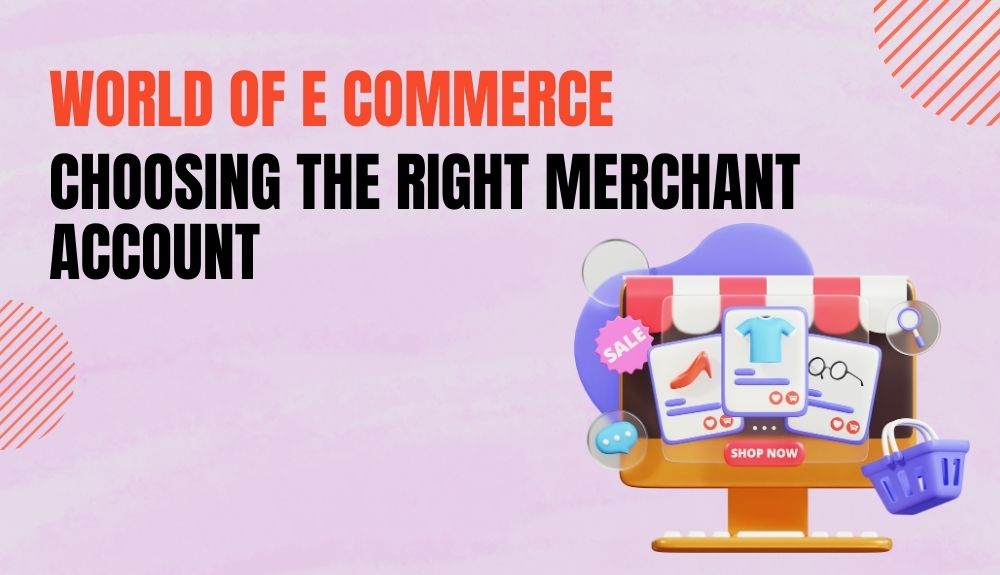Master the World of E Commerce: Choosing the Right Merchant Account
Are you ready to take your e-commerce business to new heights? Imagine having the perfect platform to sell your products, process payments seamlessly, and attract customers from all over the world. Well, it’s time to make that dream a reality. In this blog, we’re diving deep into the world of e-commerce and exploring the crucial role of choosing the right merchant account.
1. Understanding Merchant Accounts
When it comes to running an ecommerce business, choosing the right merchant account is crucial for smooth payment processing and customer satisfaction. By understanding the ins and outs of merchant accounts, business owners can make informed decisions and ensure a seamless shopping experience for their customers.
1.1 What is a Merchant Account?
A merchant account is a type of bank account that allows businesses to accept credit card payments from their customers. It serves as an intermediary between the business, the customer’s bank, and the payment processor. Merchant accounts facilitate the transfer of funds from the customer’s bank to the business owner’s business bank account.
1.2 Importance of Choosing the Right Merchant Account
Selecting the right merchant account is vital for several reasons. Firstly, it directly impacts the payment process, making it fast, secure, and hassle-free for customers. Secondly, it affects the business’s ability to accept different payment methods, including credit cards, debit cards, and even alternative payment options. Lastly, the right merchant account can offer a range of features and customer support, ensuring smooth transactions and prompt issue resolution.
1.3 Key Factors to Consider
When evaluating merchant account providers, it’s important to consider the following factors:
1.3.1 Payment Processing Options
Different businesses have different payment processing needs. Some might require a virtual terminal for mail or phone orders, while others may prefer integrations with popular shopping cart platforms. It’s crucial to assess whether the merchant account provider offers the necessary payment options to meet specific business requirements.
1.3.2 Pricing Models and Fees
Understanding the pricing models and associated fees is essential to avoid surprises and minimize costs. Common pricing models include interchange-plus pricing and flat-rate pricing. Additionally, business owners should evaluate the monthly fees, transaction fees, chargeback fees, and any additional costs related to the merchant account.
1.3.3 Security and Compliance
To protect both the business and its customers, it’s crucial to choose a merchant account provider that prioritizes security and compliance. Look for providers that are PCI compliant and offer robust fraud prevention measures to mitigate risks associated with online transactions.
1.3.4 Customer Support and Service
Prompt and reliable customer support is crucial, especially when technical issues or payment disputes arise. Look for merchant account providers that offer 24/7 customer support via multiple channels, such as phone, email, or live chat. Reading reviews and testimonials can provide insights into the quality of their customer service.
2. Importance of Choosing the Right Merchant Account
When it comes to running a successful e-commerce business, choosing the right merchant account is crucial. A merchant account acts as a gateway that allows online businesses to accept payments from their customers securely and efficiently. It serves as a bridge between your online store and the payment processor, ensuring that transactions are processed smoothly.
So, why is choosing the right merchant account so important? Let’s take a closer look:
1. Seamless Payment Processing: The merchant account you select will determine how seamlessly your customers can make payments on your website. A reliable merchant account provider will offer a user-friendly payment gateway that integrates seamlessly with your shopping cart, providing a smooth and hassle-free checkout experience for your customers.
2. Variety of Payment Options: Different customers prefer different payment methods. By choosing the right merchant account, you can cater to the diverse needs of your customer base. Whether it’s accepting credit cards, debit cards, or alternative payment methods like digital wallets, a good merchant account should offer a wide range of payment options to ensure maximum convenience for your customers.
3. Enhanced Security: With the rise in online fraud and security breaches, ensuring the safety of your customers’ payment information is paramount. A reputable merchant account provider will prioritize security measures such as Payment Card Industry Data Security Standard (PCI DSS) compliance, encryption protocols, and fraud protection tools. By choosing a provider with robust security features, you can build trust with your customers and safeguard their sensitive data.
4. Reliable Customer Support: As an online business owner, having responsive customer support is essential. Issues related to payment processing can arise at any time, and having reliable customer support from your merchant account provider will ensure that these issues are resolved promptly. Look for a provider that offers 24/7 customer support via multiple channels such as phone, email, and live chat.
5. Transparent Pricing Structure: Understanding the costs associated with your merchant account is crucial for managing your e-commerce business effectively. Look for a provider that offers transparent pricing with no hidden fees or additional costs. Whether it’s a flat-rate pricing model or a tiered pricing structure, make sure you have a clear understanding of the fees involved, such as transaction fees, monthly fees, and any other charges. This will help you make an informed decision and avoid any surprises down the line.
💡 key Takeaway: Choosing the right merchant account is vital for the success of your e-commerce business.
3. Key Features to Look for in a Merchant Account
When it comes to selecting the right merchant account for your ecommerce business, there are several key features you should consider. These features will not only ensure smooth payment processing but also contribute to the overall success of your online store. Let’s explore the essential features that you should look for when choosing a merchant account provider.
1. Payment Gateway Integration:
One crucial feature to consider is seamless integration with a reliable payment gateway. A payment gateway acts as a bridge between your online store and the financial institutions, facilitating secure and efficient credit card transactions. It is essential to choose a merchant account provider that offers a wide range of compatible payment gateways to ensure compatibility and flexibility for your ecommerce platform.
2. Competitive Pricing Model:
Pricing plays a significant role in selecting the right merchant account. Look for a provider that offers transparent pricing with no hidden fees. Flat-rate pricing models, where you pay a fixed percentage per transaction, can be beneficial for small businesses and startups. However, if your business processes a higher volume of transactions, you may want to consider interchange-plus pricing, which may offer lower rates based on the actual interchange fees charged by the card networks.
3. Robust Security Measures:
With the increasing number of cyber threats, ensuring robust security measures is crucial when handling customer transactions. Look for a merchant account provider that offers Payment Card Industry Data Security Standard (PCI DSS) compliance. This certification ensures that the provider follows stringent security protocols to protect sensitive customer data. Additionally, features like tokenization and fraud detection tools are vital to safeguard your business and provide peace of mind to your customers.
4. Compatibility with Shopping Carts:
Compatibility with popular ecommerce platforms and shopping carts is essential for a seamless checkout experience. Whether you are using WooCommerce, Shopify, Magento, or any other platform, make sure your chosen merchant account provider offers easy integration with your preferred shopping cart. This way, you can avoid any technical complications and streamline your payment process.
5. Reliable Customer Support:
Having access to reliable customer support is vital when it comes to resolving any issues or queries promptly. Look for a merchant account provider that offers 24/7 customer support, preferably through multiple channels such as phone, email, and live chat. A responsive support team can save you time and help you maintain a smooth operation for your online business.
💡 key Takeaway: When choosing a merchant account for your ecommerce business, prioritize key features such as payment gateway integration, competitive pricing models, robust security.
4. Comparing Merchant Account Providers
When it comes to choosing the right merchant account provider for your e-commerce business, it’s essential to compare your options carefully. Not all providers are created equal, and selecting the best one can significantly impact your online payment processing experience. Let’s take a closer look at some key factors to consider when comparing different merchant account providers:
1. Pricing Models:
Flat-Rate Pricing: Some merchant account providers offer a simplified pricing model, where you pay a fixed rate per transaction. This option can be beneficial for small businesses with low sales volume.
Interchange-Plus Pricing: This model itemizes the different fees associated with each transaction, providing transparency and potentially cost savings for larger businesses.
2. Application Process:
Simplified Application: Look for merchant account providers that offer a straightforward and streamlined application process. Avoid lengthy paperwork and excessive documentation requirements that can delay your approval.
Fast Approval: Time is of the essence in the online business world. Opt for providers with quick approval processes to set up your merchant account promptly.
3. Payment Processing Options:
Online Payment Gateway: Ensure that the merchant account provider offers a reliable and secure online payment gateway that seamlessly integrates with your e-commerce website.
Virtual Terminal: If you plan to process phone or mail orders, check if the provider offers a virtual terminal. This feature allows you to manually input credit card information for card-not-present transactions.
4. Customer Support:
24/7 Support: Look for merchant account providers that offer round-the-clock customer support. This ensures that you can quickly resolve any issues or concerns that may arise at any time.
Dedicated Account Manager: Having a dedicated account manager can provide personalized assistance and guidance to help you optimize your payment processing operations.
5. Additional Services and Features:
PCI Compliance: Ensure that the merchant account provider is Payment Card Industry (PCI) compliant to protect your customers’ sensitive payment information.
Support for Different Payment Types: Check if the provider supports various payment methods, including credit cards, debit cards, and online wallets such as PayPal.
Gift Card Options: If you plan to offer gift cards to your customers, see if the provider offers this feature or integrates with third-party gift card service providers.
By carefully evaluating these factors and comparing merchant account providers, you can make an informed decision that aligns with your ecommerce business’s unique needs.
5. Choosing the Right Merchant Account for Your Business Needs

When it comes to running an online business, one of the most crucial decisions you’ll make is selecting the right merchant account. A merchant account is essentially a type of bank account that allows you to accept and process credit and debit card payments from your customers. With so many options available in the market, it can be overwhelming to determine the best merchant account provider for your specific business needs. To help guide you in making this important decision, let’s explore some key factors to consider.
1. Payment Processing Options:
Different merchant account providers offer various payment processing options. It’s important to evaluate whether you need an all-in-one solution that includes a payment gateway, shopping cart integration, and virtual terminal, or if you already have some of these services in place and only require a payment processor. Understanding your business requirements will help you narrow down the providers that offer the right payment processing options for your needs.
2. Pricing Models and Fees:
Merchant account providers have different pricing models and fee structures, and it’s crucial to carefully analyze them before making a decision. Some providers charge a fixed percentage fee for each transaction, while others may charge a flat-rate fee. Additionally, there may be monthly fees, setup fees, or additional costs for services such as customer support or PCI compliance. By comparing and contrasting the pricing models of various providers, you can determine which option best aligns with your budget and sales volume.
3. Payment Types and Card Acceptance:
Consider the types of payment methods and cards you want to accept. Do you need to process American Express or gift card transactions? Ensure that the merchant account provider you choose supports the payment types and card acceptance you require for your online store. This will help prevent any limitations or restrictions on the payment options available to your customers.
4. Application Process and Approval Time:
The ease and efficiency of the application process are important factors to consider. Some merchant account providers have a streamlined and user-friendly application process, while others may require more extensive documentation. Additionally, keep in mind the approval time-frame, as timely approval is necessary to start processing payments and running your online business smoothly.
5. Reputation and Customer Support:
Research the reputation and reliability of the merchant account providers you are considering. Look for testimonials, reviews, or ratings from other business owners to gauge their experience and satisfaction with the provider. Additionally, assess the level of customer support offered by each provider.
6. Steps to Set Up a Merchant Account
Setting up a merchant account for your e-commerce business is an important step towards accepting online payments. This section will guide you through the process in six simple steps.
Step 1: Research Merchant Account Providers
Before diving into the application process, take some time to research different merchant account providers. Look for companies that specialize in e-commerce and have a proven track record of reliability and customer satisfaction. Consider factors such as pricing models, customer support, and additional costs like monthly fees or transaction fees. It’s crucial to find a provider that aligns with your business needs and offers the best value for money.
Step 2: Determine Your Business Requirements
Next, evaluate your business requirements and determine what features and services you need from a merchant account provider. Consider factors like the types of payment methods you want to accept (credit cards, debit cards, online payments, etc.), your anticipated monthly transaction volume, and whether you need a payment gateway or a virtual terminal. This will help narrow down your options and find the provider that can accommodate your specific needs.
Step 3: Complete the Application Process
Once you’ve identified a suitable merchant account provider, it’s time to begin the application process. Typically, this involves filling out an online application form with your business details, such as your company name, address, and tax identification number. You may also be required to provide supporting documents, such as proof of business ownership, bank statements, or financial records.
Step 4: Ensure PCI Compliance
Payment Card Industry Data Security Standard (PCI DSS) compliance is crucial for protecting your customers’ payment card information. Make sure your e-commerce website meets the necessary security requirements to ensure the safety of sensitive data. This may involve implementing security measures like SSL certificates, encryption protocols, and secure payment gateways. Compliance with PCI standards not only safeguards your customers’ information but also helps build trust in your business.
Step 5: Set Up Payment Processing
Once your merchant account application is approved, work with your chosen provider to set up payment processing on your e-commerce website. This involves integrating the necessary payment gateway or virtual terminal to facilitate smooth and secure transactions. Your merchant account provider should guide you through the technical aspects of this process to ensure everything is properly configured.
Step 6: Test and Launch
Before going live, it’s essential to test your payment processing system thoroughly. Make a few test transactions using different payment methods to ensure everything is working as expected.
7. Common Mistakes to Avoid When Choosing a Merchant Account
When it comes to choosing a merchant account for your e-commerce business, there are several common mistakes that business owners often make. By being aware of these pitfalls, you can avoid making the same errors and ensure that you select the right merchant account provider for your needs.
1. Not considering your business’s specific requirements:
Each e-commerce business is unique, with different payment processing needs. It’s crucial to analyze your specific requirements and choose a merchant account that aligns with them. Consider factors such as the average transaction volume, types of payment methods you want to accept (credit/debit cards, online payments, gift cards, etc.), and whether you require additional features like a virtual terminal or shopping cart integration.
2. Ignoring pricing models and fees:
Pricing models and fees can significantly impact your e-commerce profitability. It’s essential to thoroughly evaluate the fee structure of each merchant account provider you’re considering. This includes examining the transaction fees, monthly fees, and any additional costs associated with the account. Keep an eye out for hidden fees that can add up over time.
3. Overlooking customer support and service quality:
Customer support is paramount when it comes to merchant accounts. You want to partner with a provider that offers reliable and accessible customer support, especially when issues arise with payment processing or account management. Look for companies that provide 24/7 customer support through various channels like phone, chat, or email.
4. Not considering security and PCI compliance:
Protecting your customers’ sensitive payment information is crucial for any e-commerce business. Choosing a merchant account provider that prioritizes security and is compliant with the Payment Card Industry Data Security Standard (PCI DSS) is of utmost importance. Ensure the provider offers robust security measures, encryption, and tokenization features to safeguard your customer data.
5. Failing to research reputation and reliability:
Before committing to a merchant account provider, take the time to research their reputation and reliability. Look for providers with a solid track record and positive reviews from other e-commerce business owners. Establishing trust with a reputable and reliable partner is critical to the success and growth of your online business.
8. Integration with Payment Gateways and Third-Party Tools
When it comes to choosing the right merchant account for your e-commerce business, one crucial factor to consider is the integration with payment gateways and third-party tools. This aspect plays a significant role in streamlining your payment processing, improving customer experience, and maximizing your online store’s functionality. Let’s explore why integration is essential and what to look for in a merchant account provider.
1. Seamless Payment Processing
Integration with payment gateways allows for seamless payment processing on your e-commerce website. The payment gateway acts as a bridge between your online store and the merchant account, securely transmitting customer payment information. By choosing a merchant account provider that offers smooth integration with popular payment gateways like PayPal, Stripe, or Authorize.Net, you can ensure a hassle-free checkout process for your customers.
2. Comprehensive E-commerce Platform Integration
In addition to payment gateways, the right merchant account should also have the ability to integrate with various e-commerce platforms like Shopify, WooCommerce, or Magento. This integration enables you to synchronize your inventory, automate order fulfillment, and manage customer data seamlessly. It ensures that your e-commerce operations run smoothly and efficiently, saving you time and effort.
3. Third-Party Tool Integration
Beyond payment gateways and e-commerce platforms, consider the integration capabilities of the merchant account provider with other essential third-party tools. These tools can include customer relationship management (CRM) systems, email marketing platforms, analytics tools, or inventory management software. Integration with these tools enables you to leverage data insights, automate marketing campaigns, and streamline your business operations.
4. Customization and Flexibility
When evaluating merchant account providers, inquire about their flexibility for customization. Every e-commerce business has unique requirements, and choosing a solution that can be tailored to your specific needs is crucial. Check if the provider allows you to customize the payment process, set up recurring billing, or accept different payment types like credit cards, debit cards, or gift cards. The more flexible the integration options, the better you can adapt them to your business model.
5. Developer-Friendly Solutions
For businesses with a dedicated development team, it’s essential to consider the developer-friendliness of the merchant account provider. Look for a provider that offers comprehensive documentation, developer tools, and APIs (Application Programming Interfaces) for easy integration. This ensures that your technical team can seamlessly integrate the merchant account into your existing systems and develop custom functionalities if needed.
9. Ensuring Payment Security and PCI Compliance
Payment security and PCI compliance are crucial considerations for any online business. As an ecommerce business owner, it is your responsibility to ensure that your customers’ payment information is safe and protected. This section will guide you through the steps and best practices to maintain a secure payment environment and comply with PCI standards.
1. What is PCI Compliance?
PCI compliance refers to the Payment Card Industry Data Security Standard (PCI DSS), which is a set of security standards that all businesses that handle cardholder data must comply with. This includes implementing strict security measures to protect cardholder information from unauthorized access and ensuring the secure transmission of data during online transactions.
2. Importance of PCI Compliance for Ecommerce Businesses
Maintaining PCI compliance is vital for several reasons:
Protecting Customer Data: By complying with PCI standards, you create a secure environment for your customers’ payment information, reducing the risk of data breaches and identity theft.
Building Trust and Credibility: Displaying your compliance status can help build trust with your customers, assuring them that their information is in safe hands when conducting transactions on your online store.
Avoiding Costly Penalties: Failure to comply with PCI standards can result in substantial fines imposed by card issuers and acquirers, which can significantly impact your bottom line.
3. Steps to Ensure Payment Security and PCI Compliance
a. Use a Secure Payment Gateway: A reliable payment gateway acts as an intermediary between your online store and the payment processor, securely transmitting payment data. Look for a payment gateway that is PCI compliant and offers encryption and tokenization for added security.
b. Implement SSL Certificate: Secure Socket Layer (SSL) certificates encrypt data during transit, providing an additional layer of security. Make sure your ecommerce website has an SSL certificate installed to protect sensitive information during the payment process.
c. Store Data Securely: Minimize the data you store, particularly sensitive cardholder data. If you do need to store payment information, ensure it is encrypted and stored in a secure environment following PCI DSS guidelines.
d. Regularly Update and Patch Systems: Keep your ecommerce platform, payment gateway, and any associated plugins or extensions up to date with the latest security patches. This helps address any vulnerabilities and ensure that you are using the most secure versions of software.
e. Conduct Vulnerability Scans and Penetration Testing: Regularly perform vulnerability scans and penetration testing to identify any weaknesses in your systems or network infrastructure.
10. Customer Support and Account Management
When it comes to choosing the right merchant account for your ecommerce business, one crucial factor to consider is the level of customer support and account management provided by the merchant account provider. Excellent customer support ensures that you receive assistance whenever you encounter issues or have questions regarding your account, transactions, or any other merchant service-related concerns.
Here are some key aspects to evaluate when assessing customer support and account management:
1. Responsive Support: Look for a merchant service provider known for their prompt and reliable customer support. Ensure that they have multiple channels of communication available, such as phone support, email support, live chat, and a dedicated support ticket system. This ensures that you can reach out to them easily whenever you need assistance or have urgent inquiries.
2. Extended Support Hours: Consider merchant account providers that offer support during extended hours, ideally 24/7. This is particularly crucial if your ecommerce business operates globally or across different time zones. Round-the-clock support ensures that you can receive assistance no matter when you encounter any issues.
3. Dedicated Account Manager: A dedicated account manager can make a significant difference in managing your merchant account effectively. They can provide personalized assistance, offer expert advice tailored to your specific needs, and help optimize your payment processing setup. Having a dedicated point of contact for your account can streamline communication and ensure that any concerns or questions are addressed promptly.
4. Comprehensive Knowledge Base: A well-organized and detailed knowledge base provided by the merchant service provider can be a valuable resource for self-help. Look for a provider that offers a robust knowledge base with FAQs, tutorials, guides, and troubleshooting steps. This will empower you to resolve common issues independently and save time by finding answers without reaching out to support.
5. Proactive Account Monitoring: Choose a merchant account provider that goes above and beyond by actively monitoring your account to identify any potential issues or irregularities. This can include monitoring for fraudulent activities, suspicious transactions, or any potential compliance issues. Proactive account monitoring helps protect your ecommerce business and provides peace of mind.
6. Resolving Disputes: An important aspect of account management is how the merchant service provider handles disputes and chargebacks. Look for a provider with a proven track record of actively assisting merchants in resolving disputes in a fair and efficient manner. Transparent dispute resolution policies and procedures are essential for protecting your business from unnecessary losses.
💡 key Takeaway: Customer support and account management are crucial factors to consider when choosing a merchant account provider.
11. Merchant Account Optimizations for Better Conversions

When it comes to running an eCommerce business, one of the most crucial decisions a business owner has to make is choosing the right merchant account. A merchant account serves as the gateway to accepting credit card and debit card payments online. It is imperative to find a reliable merchant account provider that offers the necessary tools, features, and customer support to streamline your payment processing and ensure a seamless online shopping experience for your customers.
To optimize your merchant account for better conversions and maximize the potential of your eCommerce business, consider the following strategies:
1. Research and Compare Merchant Service Providers:
Take the time to research and compare different merchant service providers to find the best option for your small business. Look for companies that specialize in serving eCommerce businesses and have a proven track record of delivering high-quality service. Compare their pricing models, transaction fees, monthly fees, and additional costs to determine which provider offers the most competitive and cost-effective solution for your online store.
2. Evaluate Payment Gateway Integration:
An efficient payment gateway is crucial for secure and seamless online transactions. Ensure that the merchant account provider integrates with popular shopping cart platforms and supports the payment gateways that your eCommerce business relies on. This compatibility will enable a smooth checkout process and enhance the overall user experience.
3. Prioritize Customer Support and PCI Compliance:
Quality customer support is essential for addressing any issues or concerns that may arise during payment processing. Look for a merchant service provider that offers reliable customer support via multiple channels, such as phone, email, or live chat. Additionally, prioritize PCI compliance to ensure the security of your customers’ sensitive payment information.
4. Consider the Application Process:
Simplify the application process by choosing a merchant service provider that offers a streamlined and efficient onboarding process. Look for providers that require minimal paperwork and offer quick approvals. This will save you time and ensure your online business can start accepting payments as soon as possible.
5. Assess Pricing Models and Fees:
Each merchant service provider may have a different pricing structure. Consider your business’s unique needs and payment volume to choose the pricing model that aligns with your objectives. Some providers offer a flat-rate pricing model, while others may have transaction-based or volume-based pricing options. Assess the pros and cons of each pricing model to find the best fit for your eCommerce merchant account.
Incorporating these optimizations into your merchant account strategy can lead to better conversions and increased revenue. By selecting the right merchant service provider and optimizing the payment process for your customers.
Conclusion
In conclusion, choosing the right merchant account is vital for e-commerce success. By understanding your business needs, considering your budget, and evaluating the features of different accounts, you can make an informed decision that aligns with your goals. Remember to prioritize security measures, seamless integration with your website, and reliable customer support. Furthermore, staying up to date with emerging payment technologies and trends will give you a competitive edge. Explore options like mobile payments and digital wallets to provide convenience to your customers and keep them coming back for more.











